- Home
- Jeff Mariotte
Serpents in the Garden Page 4
Serpents in the Garden Read online
Page 4
“I do,” Tyree said.
“Why put so much effort into a defense that can’t ultimately succeed, against an attack that’s not coming?”
“We do what we can do, James.” Tyree waved to a lookout high up in a corner tower. “There has not been a concerted Victor offensive against us, but there might yet be. If we can hold them off, we will. If we can delay the end, we will do that.”
“How did your population grow so much?” Kirk asked. “How many tribes have you brought together in Freehold?”
“Seven,” Tyree said with what sounded like pride. “People from throughout the hills and mountains. For their protection, against being taken.”
“Taken? For what purpose?”
“The able-bodied, they want as laborers. The less able as breeders. The children, for when they grow up to be either one.”
“They’re taking slaves?”
“Yes. Slaves, to do the work they would not do themselves. Many of those you knew, from before, are either dead or enslaved.”
“And they’ve expanded their village. Victory.”
“Yes, James. They have brought together twenty tribes or more. Given them homes within the walls of Victory, in return for their fealty to Victory’s governor, Apella. They have capabilities that we do not, and enough people to pose a serious threat.”
Kirk indicated a lookout with one of the lever-action rifles. “Those rifles?” he asked. “Those aren’t the flintlocks I gave you. Did you make them?”
Tyree chuckled, but without humor. “We captured them from the Victors. They can make them, but we cannot. We are a simple people, James, as you know. Would that we could remain that way.”
“Amen to that,” Kirk said.
“Excuse me?”
“Never mind. You’re still the chief? Of everyone, including the new tribes you’ve brought into Freehold?”
Tyree raised his hands in a kind of shrug. “Not by choice. The people demand it. Ever since you provided those rifles. It is strange, James. I hear my name spoken by those I have never met. I hear stories from far away. Everyone knows my name, it seems, as if I were some creature of legend, not a simple man who can bleed and die like the rest.”
“You’ve become a symbol,” Kirk said. He suspected it was difficult for Tyree, who had always been humble. That had been the root of the problem between Tyree and Nona, and the underlying cause of Nona’s death—she had greater ambitions for her husband than he had for himself, and she had seen his humility as a drawback. “Of the fight for freedom.”
“Perhaps,” Tyree said. “I would rather be a man than a symbol.”
“We don’t always get a choice.”
They turned down one of the roads that cut through the town, heading away from the wall. There were shops along this road: a butcher, a woodcarver, a wheelwright, a weaver. The economy of Freehold still seemed to be largely agrarian and hunting, but a merchant class appeared to be establishing itself. People cast suspicious gazes at Kirk as they walked by, but seeing him with Tyree seemed to mellow that distrust. “Why have you returned, James? You said to investigate something, but you did not say what. How can we help you?”
“Your hospitality is already helping,” Kirk replied. “My people need a safe base of operations. We’ll want to get into Victory during the time we’re here, but staying there would be too dangerous.”
“Going near it is dangerous enough.”
“I’m sure you’re right, but I’m afraid we must.”
“We will help in any way we can.”
“Thank you, Tyree,” Kirk said.
“They killed Nona,” Tyree said. “They also killed my brother, Salree.”
“I’m sorry to hear that.”
“I have taken in his widow, Elanna, and her son, Nyran. He is almost a man. Elanna is not Kahn-ut-tu. There are few Kahn-ut-tus left among us. Another part of our heritage that the Victors are stealing from us.”
“Is she . . . your new wife? Elanna?”
“No,” Tyree answered quickly. “It is tradition for a man to take in his brother’s widow. So there is always a father to help teach the children. If a woman with children dies, her sister takes in the widower and children, so there is always a mother. This is our way. It—”
He was about to continue, but a young man came tearing up the road, bumping into pedestrians and calling Tyree’s name. When he saw Tyree, he made a beeline toward him. When he stopped, he was out of breath, cheeks flushed. He bent over, hands resting on his knees, and tried to breathe.
“What is it, Nok?” Tyree asked. “Take a breath, now, and tell me slowly.”
“Victor slavers!” Nok said. He didn’t look older than twelve, maybe thirteen. His hair was the same platinum color as Tyree’s. “Coming up the Trail of the Four Sisters.”
Tyree caught Kirk’s gaze. “That is too near,” he said. “We will have to respond.” He clapped Nok on the back. “A war party,” he said. “Tell Yutan and Kah’lee to gather a war party. I will join them shortly near the gate.”
Nok nodded his understanding and darted off.
“I’ll come, too,” Kirk said. “With my people.”
“You do not need to—”
“I’d like to see their capability,” Kirk said. He hoped to spot some clue to a Klingon presence. And protecting Freehold was important, since they were guests there. “Give us guns, in case we need to defend ourselves.”
“I have seen you fight, James. I would welcome your help.”
“We’ll want to stay neutral if we can, but I’d rather not be unarmed. I’ll get the others and meet you at the gate.”
“At the gate, then,” Tyree said. With a last touch of Kirk’s shoulder, he hurried away.
* * *
Kirk found the others in their temporary quarters, enjoying a brief moment of relaxation. “Come on,” he said as he entered. “There’s a Victory party on the march and we’ve got to go.”
“A victory party?” Rowland asked. “What victory?”
Kirk reminded them about the name, realizing he would have to be more careful with his phrasing until everybody got used to the somewhat self-aggrandizing title the Villagers had bestowed upon themselves. “Let’s go.”
Ten minutes later, they had joined the gathering throng near the main gate. A couple of Freeholders stood at a weapons locker, handing out guns—flintlocks that had seen better days and some newer lever-action rifles—to those who didn’t already have them. Most people brought their own weapons, some rifles, others carrying a bow and a quiver full of arrows, or a spear. Almost everyone wore a knife.
On the way, Kirk had run through a brief summary of what he’d discussed with Tyree. “We don’t want to engage the Victors if we can help it,” he’d added. “We’re officially neutral. At the same time, there won’t be peace if the Victors achieve total . . . well, victory. And inasmuch as we’re guests of the Freeholders, we should try to make sure they aren’t slaughtered or enslaved.”
“Sounds like a reasonable goal,” Hay said.
“How neutral do you want to stay, sir?” Burch asked. “We either fight on the Freeholders’ side, or we don’t fight and run the risk of them getting beat.”
“We’ll play it by ear,” Kirk replied. “If there’s a way to avoid fighting, we take it. If there’s a way to head off conflict altogether, that’s better still. But if push comes to shove, we side with our hosts.”
Now, armed with the Freehold-provided guns, they moved at a quick pace down the hill from the fortified town, across a grassy plain, and toward a boulder-strewn patch of wilderness. Someone pointed out the “Four Sisters,” and from this angle Kirk understood the name: four rock formations flanking the trail, they towered over the landscape, and their shapes vaguely resembled standing humanoid figures with heads bowed. Weeping, maybe, or lost in prayer. It helped if he squinted.
Just beyond the Four Sisters, the trail descended steeply, winding through a rocky maze of a canyon. There, a pair of scouts joined the
m from down-trail, and the group stopped to develop a plan of action. Knee-tall grass imparted a rich, lush aroma to the day, but thirty or so armed and sweating men and women overwhelmed it.
“They will come up here, out of that canyon,” Tyree said. “This is where we fight them. As soon as they are all in the open, we attack.”
“Do we know how many are in the raiding party?” Kirk asked.
Tyree looked to the scouts. One of them did a quick head count of the Freeholders. “Perhaps twice our number,” she said. “Or a little more than.”
“A direct confrontation could be tricky,” Kirk said. “Unless we can send word back to Freehold for more fighters.”
“There is no time,” the scout said. “They are too close.”
Kirk scanned the surrounding landscape. Huge piles of boulders were everywhere, rocks on top of rocks stacked on bigger rocks. The canyon’s mouth was a relatively narrow gap in the middle of it all, and until someone emerging from it reached the boulder fields, they would be out in the open.
“Can I make a suggestion, Tyree?”
“Of course, James. I trust your judgment.”
Kirk had once shown Tyree how to use a flintlock; he guessed that was what it took to be a military expert in the man’s eyes. “What if instead of engaging them directly, you positioned your people among these boulders?” he asked. “Everybody who has a gun points it toward the mouth of the canyon.”
“And then we shoot when they appear?”
“No,” Kirk said. “Every third person steps a few paces away from his or her gun. Leave the weapon so it’s visible, pointing into the canyon, but then when the time comes, each warrior shows himself—or herself—to the enemy. Not enough to be in danger, but enough to let them know they’re up here. That way, your force looks a third again larger than it is. With all those guns pointed at them, and uncertainty about how many people you really have, maybe they’ll be discouraged.”
“If not?”
“Then everybody returns to their guns—quickly—and fires from the shelter of the rocks. Only seconds will be lost, but if it works, the Victors might be turned away with no loss of life.”
Tyree chewed his lower lip, thinking. Kirk could almost read his thoughts from the expression he wore. On the one hand, direct engagement with the enemy, which might be satisfying on some visceral level but might also result in a number of dead Freeholders. On the other, an ambush might, or might not, result in bloodshed.
Finally, he smiled. “Yes,” he said. “We will try your plan, James.” He repeated the basic instructions, louder, so everyone could hear. After some initial objections—nobody wanted to walk away from their guns, but they didn’t mind if the person beside them did—the Freeholders acknowledged their orders and set about stationing themselves in the rocks.
Kirk, Rowland, Burch, and Hay joined the defenders, interspersing themselves rather than standing together. As he moved into place, Kirk studied the gun he’d been given. He was surprised by how comfortable the lever-action rifle was to hold and presumably to shoot—it was remarkably light, and the stock nestled into his shoulder. Whoever had designed the thing had done a good job.
He wedged the weapon between a couple of good-sized rocks, positioned so the muzzle pointed directly at the canyon’s mouth. With that in place, Kirk moved three steps to his left, to a spot where he was protected from incoming fire by a large boulder, but he could show himself in such a way that he would be visible from below. On a whim, he grabbed a downed branch from a nearby tree. It still had some leaves on it, and he thought that if he occasionally shook it on the far side of the boulder, it might look like the movement of yet another Freeholder.
The Freeholder immediately to his left watched him with a bemused look on her face. She was muscular, several centimeters shorter than Kirk, but not petite. Her hair was a caramel color, her skin sprayed with freckles. Rose-colored gems glittered on her cheek, accentuating high cheekbones. Like Tyree, she had a series of black bars tattooed down her arm. He counted nine. “This was your idea?” she asked. Her blue eyes blinked a couple of times. “Hiding like this?”
“Yes,” Kirk admitted. “So they don’t know that they outnumber us.”
“It is . . . clever. I like to see the eyes of my enemy when I kill him. But this too might be satisfactory.”
“I’m not opposed to killing when it’s necessary,” Kirk said. “But I always think it should be a last resort, not a first choice.”
She eyed him anew, as if she expected to see a second head or a third arm on him. Her smile had grown a little, and Kirk realized she was very, very pretty when she smiled. “You are a strange one,” she said. “Your name is James?”
“That’s right.”
“I am Elanna.”
It took him a moment to connect the dots. “Tyree’s brother’s wife?”
“Yes. Tyree told you?”
“He and I are old friends.”
“He has spoken of you many times.”
Kirk was pleasantly surprised. He had expected that most of Tyree’s memories of him would be sad ones. Elanna hadn’t said that Tyree had spoken well of him—he might have used Kirk’s name as a curse every time he hit his thumb with a hammer. Or whatever people with limited metalworking capability used for a hammer. A rock.
“I’m pleased to meet you,” Kirk said. He nodded his head toward the canyon below. “I wish it were under better circumstances.”
“Soon the circumstances will improve. The ground will be soaked with the blood of our enemies.”
Not exactly what I had in mind, Kirk thought. He left the words unspoken, and waited for the signal.
Soon enough, it came. Kirk heard Hssst! sounds travel around the defensive force, and he looked down to see the first Victors emerging from the canyon’s mouth. They looked much as he remembered: mostly men, dark-haired, wearing clothes that covered a little more than the typical Hill People garb. He didn’t know if it was colder in the valley, or if the people were more modest, but he had noticed the same thing on his last visit.
More of them issued from the canyon, and he saw that they had prisoners with them. The captives had ropes knotted about their wrists, each one connected to the ones in front and behind, so they made a chain of almost a dozen people. He had counted forty Victors—and they were still coming—when one of them looked up toward the rocks, pointed, and shouted an alarm.
In response, a Freeholder fired at him.
The round fell short—probably a flintlock, Kirk thought, its trigger yanked by someone in a panicked reaction to being spotted. The Victors below dropped behind whatever cover they could find and started shooting, almost indiscriminately, toward the rocks. Freeholders returned fire. Kirk held his ground, showing his head and hands occasionally, sometimes shaking the branch, and he hoped others were doing the same.
Watching the Victors, it was obvious that the arms race had continued, and the Victors still had a technological advantage. Some of their weapons held ammunition clips, so they could lever and fire until the clip was finished, and then reload by simply ejecting the empty and ramming home a new one. The few Freeholders who had more modern rifles fired as quickly as they could, but they couldn’t keep up, and those armed with flintlocks, or worse, arrows and spears, had no hope of doing so.
Despite their technological disadvantage, Kirk saw that most of the Freeholders had held their positions. Better still, their protected placement meant that the Victor rounds were making a lot of noise but doing little damage. The Victors were, in large measure, out in the open, and dropping fast under the Freeholder onslaught. A couple of the Victors, ones he took to be leaders, were eyeballing the Freeholder positions, and after a few minutes, they gave orders to fall back into the canyon.
Shortly after that, all gunfire ceased. The ringing in Kirk’s ears filled the sudden silence, and his nose and throat were ragged from the thick cloud of smoke hanging over the hills. Then a whoop went up throughout the Freeholder ranks. The Victors
—and Kirk had to question that self-appellation more than ever—were running away, retreating through the canyon as fast as they could. They had even left their prisoners behind. And their dead.
Kirk scooped up his rifle and started toward where the Freeholders were gathering. Elanna caught up to him. “Your plan seems to have worked, James,” she said. “Well done.”
“Thanks,” he said. “I’m just glad we didn’t take many casualties.”
“Tyree was right about you, I think.”
Kirk didn’t respond. He had not made up his mind about Tyree. The man had changed, hardened. The admiral wasn’t at all sure he wanted to be the kind of man the new Tyree would admire.
Six
That night, a celebration was held in Freehold’s central plaza. The place had not existed during Kirk’s last visit, but then, neither had most of the town. When people had gathered in the Hill People’s camp, it had been to sit on stones around a small fire pit. Now there were permanent structures, set on roads of hard-packed earth. Tables hewn from logs too small to have been used on the settlement’s walls were scattered about the plaza. A fire burned in a massive central pit, its flames roaring into the air and hurling up showers of sparks that almost seemed to merge with the stars. At secondary, smaller fires, people took mammals about the size of squirrels, skewered them with fresh vegetables from Freehold’s gardens, and held them over the flames. The aroma of roasting meat mingled with the smells of sweat and alcoholic drink and the wood smoke from the bigger blaze. It made Kirk glad he was here just now and not stuck behind his desk, listening to the complaints of some Federation bureaucrat.

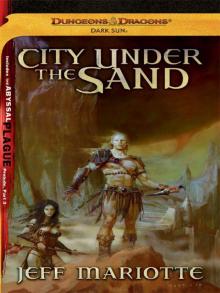 City Under the Sand
City Under the Sand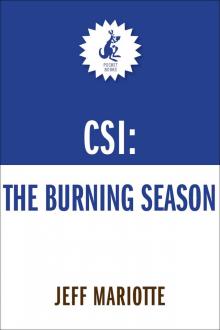 The Burning Season
The Burning Season Sanctuary
Sanctuary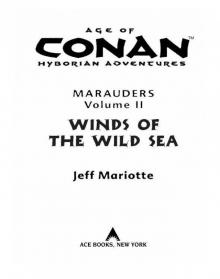 Winds of the Wild Sea
Winds of the Wild Sea Serpents in the Garden
Serpents in the Garden Close to the Ground
Close to the Ground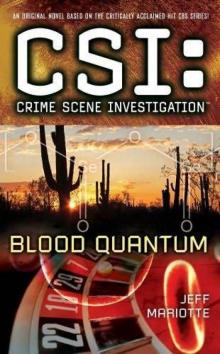 Blood Quantum
Blood Quantum Brass in Pocket
Brass in Pocket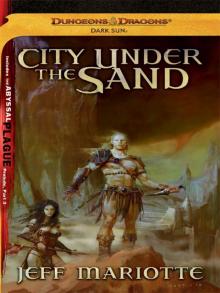 City Under the Sand: A Dark Sun Novel (Dungeons & Dragons: Dark Sun)
City Under the Sand: A Dark Sun Novel (Dungeons & Dragons: Dark Sun)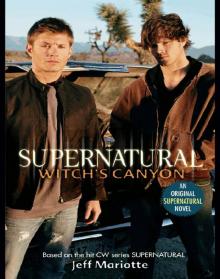 Witch's Canyon
Witch's Canyon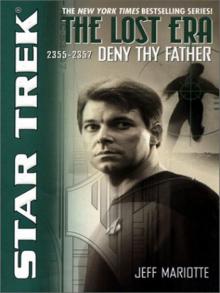 STAR TREK: The Lost Era - 2355-2357 - Deny Thy Father
STAR TREK: The Lost Era - 2355-2357 - Deny Thy Father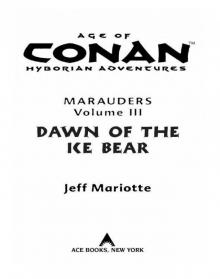 Dawn of the Ice Bear
Dawn of the Ice Bear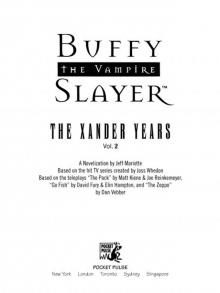 The Xander Years, Vol.2
The Xander Years, Vol.2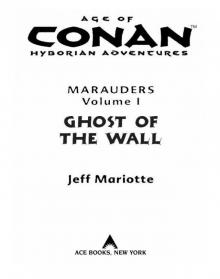 Ghost of the Wall
Ghost of the Wall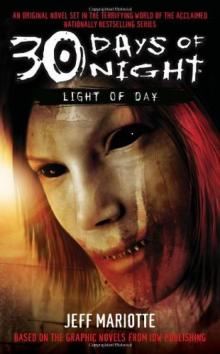 30 Days of Night: Light of Day
30 Days of Night: Light of Day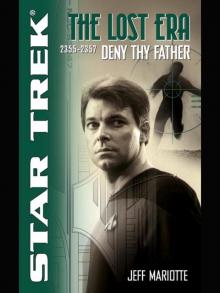 Deny Thy Father
Deny Thy Father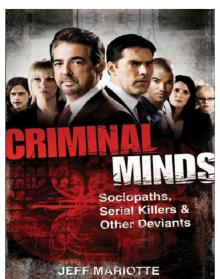 Criminal Minds
Criminal Minds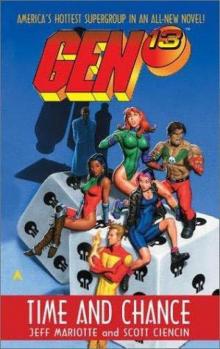 Time and Chance
Time and Chance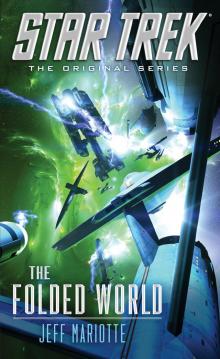 The Folded World
The Folded World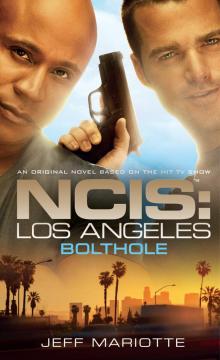 Bolthole
Bolthole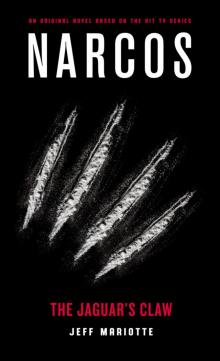 Narcos
Narcos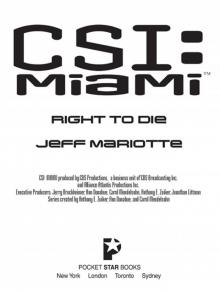 Right to Die
Right to Die